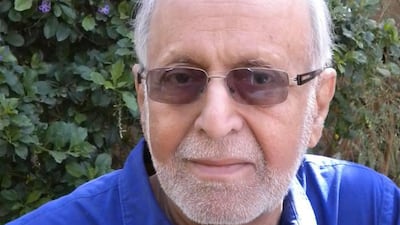There's a moment in Prodigal, Pakistani writer Irshad AbdulKadir's latest novel, where the protagonist Akbar Ali is severely tested, where everything he thought he knew about God comes into question. It's this emotional abyss, as well as figuring out his purpose and calling, that is at the heart of this passionate story. For AbdulKadir, 85, the book is a reflection of a lifetime of ruminations about God, the universe and the roles we play as individuals in the grand narrative – a slight departure from his days as an active civil rights activist and author of articles on governance and politics.
AbdulKadir has led what one would call a full life. Now a resident of Karachi, he practised law for several decades, armed with an education from Cambridge. This included a 17-year stint in the UAE, where he was part of one of the country's oldest law firms, now known as Afridi & Angell.
He has worn many other hats – lecturer in legal studies, social activist arguing for free speech and democracy, documentary filmmaker and theatre critic. But his favourite has always been writing. "I was always inclined towards it, and when I stopped active practice, time presented opportunity," AbdulKadir tells The National. Prodigal is his third book, after Clifton Bridge: Stories of Innocence and Experience From Pakistan (2013) and The Deriabad Chronicles (2018). The former is on the negotiating table to be made into a TV series.
Even though he has been under the weather, AbdulKadir is the perfect subject to chat to, as we did on Skype as his granddaughter held up the phone for him. (He later introduces me to her and graciously invites me to his home if I'm ever in Karachi). It's almost embarrassing to enquire about age, but he divulges it with old-world humour and a twinkle in his eye, saying, "Oh, now the cat's out of the bag!"
Prodigal is a result of AbdulKadir's meditations on various facets of Islam – its intellectualism, religiosity and divinity, and where these three intersect, as well as digress. Arguments between characters ranging from fanatics to scholars to professors are scattered across the book. Through Akbar, there's continuous exploration of the texts and scriptures going back centuries, which seek to explain Islamic scholarly tradition.
But Akbar's out-of-body experiences – an aspect that's at the heart of Sufism, for example – present the possibility of a relationship with God. However, AbdulKadir believes people who are able to communion with God "are chosen, as examples for us. Some people are obviously touched. Transcendence is appealing".
And while AbdulKadir isn't one of them, he says he has witnessed it happening to someone else. "I watched someone disappear while I was waiting," he says. He was watching a man meditate when he suddenly saw him in a trance, as if his spirit was transported to a higher plane, leaving his body rigid and unmoving. "It appeared that he had vanished into a dream."
AbdulKadir's previous books, however, had little to do with divine connections. Clifton Bridge, for example, touched upon the everyday lives of Pakistanis, and the struggles they face. He cringes while classifying the stories as set in the middle class, because he doesn't consider himself classist. The Deriabad Chronicles, on the other hand, is a fictitious story that focuses on the offspring (from different wives) of the ruler of the Indian princely state of Deriabad, and the inevitable family secrets and mysteries that unravel in the process. "It explores the realities of adjusting [to the world]," says AbdulKadir. "The ending, however, is something of a fantasy." Prodigal is his most political book yet.
Considering the volatile sociopolitical climate, resistance from different corners of the Islamic world isn't difficult to imagine, especially from conservative quarters. In fact, AbdulKadir takes extremism by its horns in this book. "These days, Islam is at the forefront in our political reality," he points out. "There's consistent tussle. The quantum of misery and fear has increased manifold since I was a little boy."
A lack of education and poverty, as well as firebrand teaching in madrasas, have adversely affected an understanding of Islam among Muslims, he says. The Quran and Hadith are in Arabic, so non-Arabs don't understand the language they pray in. Additionally, the pantheon of Islamic scholarly texts requires knowledge of the likes of Farsi, Urdu and Turkish, to be understood by the reader, and even then, their content is not easily understandable without some scriptural or theological understanding. "I have read translations, but it's been difficult," says AbdulKadir. "There are so many layers, meanings and nuances to these texts, a mysticism which words cannot fully encompass."
Prodigal does come across as heavy in parts, and the reader may feel lost amid the stream of arguments or philosophical narratives. But it is precisely in these that one can just about begin to understand the width and depth of a religion so vastly misunderstood, misinterpreted and maligned. On the humanistic side, what's most fascinating are the ways in which people around Akbar come to terms with his divine reality – his family, friends, mentors – and how efforts are made to apparently secularise him or exploit him. Akbar too is periodically conflicted about his purpose and calling; the question AbdulKadir poses for him is: "I can go towards divine communion, but is that good for humanity?"
At around 300 pages, Prodigal is a charming read that grapples with grief and struggle in a matter-of-fact yet compassionate manner. For anyone with a curious mind, it will raise many questions, which is perhaps what AbdulKadir is aiming for.

